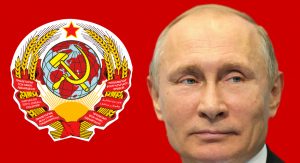Must-Read: How Russia Manipulates the Media to Create Unrest in the West
 Russian dictator Vladimir Putin learned valuable lessons not only during his days as a top KGB manager but afterward, particularly about Western media. The Conversation goes into depth with an analysis of Putin’s success at playing the West:
Russian dictator Vladimir Putin learned valuable lessons not only during his days as a top KGB manager but afterward, particularly about Western media. The Conversation goes into depth with an analysis of Putin’s success at playing the West:
The crisis embroiling the West and Russia over the apparent use of chemical weapons in the English cathedral town of Salisbury can tell us a lot about how the Putin administration is becoming more and more adept at manipulating media coverage of events to gain advantage, both at home and abroad.
The furious accusations levelled against Moscow by the UK government in recent weeks appear to be helping boost Vladimir Putin’s position at home. Cycles of hyperbole and mistrust tend to play well for Putin at home. The “categorical” statements by members of the British government which, so far at least, have not been supported by the public release of hard evidence, have provided further ammunition to the Kremlin’s narrative.
And despite having a low regular viewership, Russia’s international media operations are discussing the “anti-Russian hysteria” in detail, hoping to generate support among particular sections of the public in the West.
Contemporary liberal democracies remain largely in the dark about the complexities of Russia’s media operations – and this leaves them ill-prepared to respond to the media manipulation strategies of what is now a growing number of neo-authoritarian regimes worldwide.
You owe it to yourself to read it all here.
